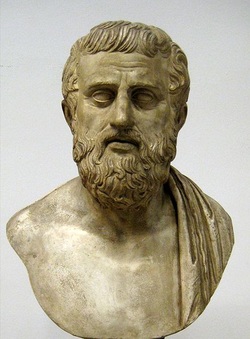In scene two of Antigone, Sentry is bringing Antigone to King Creon because she’s the one who buried Polynieces, Antigone’s brother. Creon asked Antigone if she knew that he had made a request for him, Polynieces, not to be buried, in which Antigone told him she did have this knowledge. She, Antigone, then told Creon that she had to bury her brother, and that she was not just going to leave him lie there for the animals to feast on. Ismene, Antigone’s sister, show up as Creon and Antigone are having words. At this point, Ismene decides she wants to die with her sister, but Antigone says that even if Ismene dies it will not lessen the death of Antigone. Creon then thought Ismene had something to do with the burial of Polynieces, but Antigone told Creon that Ismene had absolutely no part in it. Without much hesitation, Creon sends the sisters off to be kept until the time of their punishment.

Sophocles was born is 496 B.C., in Colonus in Attica, which is close to a mile from Athens. His father’s name is Sophillus. Sophocles had an excellent education. He did like to act but gave it up to become a part of “Board of Generals.” Surprisingly, Sophocles was a general in the Persian/Peloponnesian wars. In his time he wrote a surplus of over 120 plays. Sophocles passed in 406 B.C.
 RSS Feed
RSS Feed